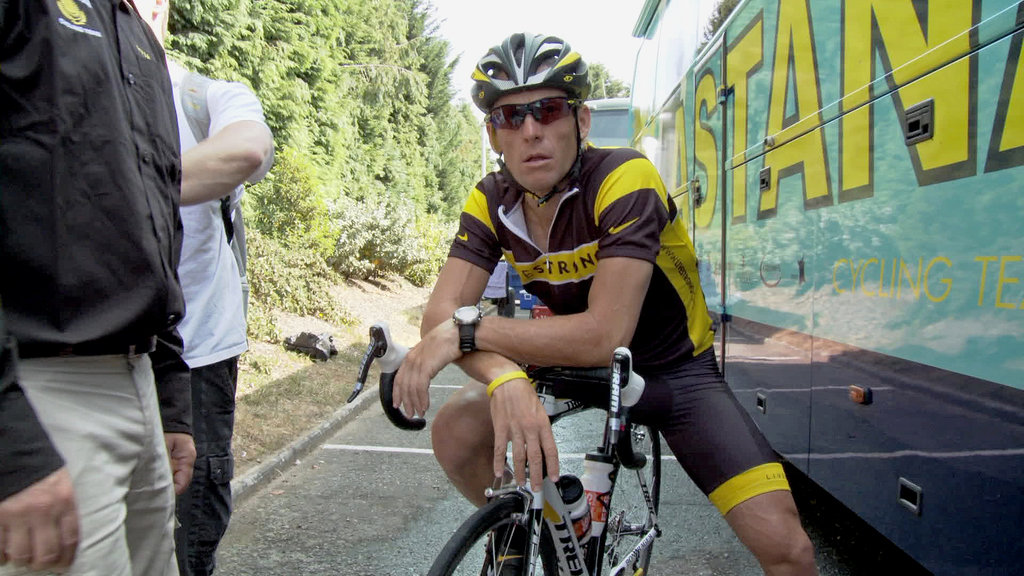By Chlotrudis Independent Film Society
Rating: 3.75 cats
Director: Alex Gibney

Country: united_states
Year: 2013
Running time: 122
IMDB: http://www.imdb.com/title/tt1638364/combined
Jason says: “Five years ago, Alex Gibney set out to make THE ROAD BACK, a documentary that followed Lance Armstrong’s comeback, hopefully to culminate in an eighth Tour de France victory. That didn’t happen, but a whole lot of other things did. As a result, when Gibney finished the movie in 2013, it had a new title and a new focus. And yet, the movie it was originally meant to be often pokes through, perhaps more than today’s Gibney intended.
“By now, the world knows the Lance Armstrong story – a young cyclist who contracts testicular cancer that remains undetected until it spreads throughout his body, but rebounds to win the Tour de France seven straight times while starting what is now the Livestrong Foundation to assist cancer patients, vigorously denies having used performance-enhancing drugs despite their being endemic to the sport, only to later confess and be stripped of all his titles and banned from the sport. His 2008-2009 comeback (he had retired after winning his seventh Tour de France in 2005) was meant to show that he was racing clean, with Gibney documenting it, but…
“Like Gibney’s other movie to come out in 2013, WE STEAL SECRETS: THE STORY OF WIKI-LEAKS, the director serves as narrator, and while he seldom shows up in front of the camera, the making of the film becomes inextricably tied in with the events he is documenting. It’s not that Gibney’s presence changes what his subjects are doing, but we see where he can and cannot go, and there’s no question that his relationship with Armstrong has grown complicated by the time the film has been finished. He’s become a journalist with a very personal axe to grind that nevertheless still wants to believe in the man who betrayed him. In that way, he is maybe not quite representing the audience on screen, but he is putting the camera right where many viewers would.
“As a result, Armstrong perhaps doesn’t come off as poorly as he should – or at least, as badly as we want him to. In some ways, it’s to be expected; the man broke out as a celebrity from what is a relatively low-visibility sport in his home country because he is almost as good at presenting himself as he is at riding a bicycle. He lies convincingly, and has always had just enough uncouth brashness to take the edge off his (unearned, as we now know) self-righteousness. That charisma still has a little power – footage of him berating a reporter who dared suggest he was less than clean can still get a viewer to take a few halting steps toward Armstrong’s corner before they remember that the other guy is actually right. And it’s kind of fascinating to try and break down the way the clips from his 2013 interviews (whether with Gibney or Oprah Winfrey) go: Just because the observant viewer will
note how he tends to talk about things that reflect negatively in the passive voice (‘this happened and was regrettable’) and those that play as positive actively (‘I did this and am proud of it’) doesn’t always make it less effective. It makes one wonder how much of this behavior is carefully planned and how much is instinctive.
“Gibney spends a lot of time on interviews with Armstrong and his former colleagues and teammates, which lets his charisma, either first- or second-hand, do its work. We do get to see some of his ruthless, nasty side, and it’s certainly off-putting, but he has a bit of trouble pulling together anecdotes and dry facts into the sort of damning indictment that works on the emotional level. His libel suits – filed in countries like the UK and France whose laws favor the plaintiff much more than those in America do – and the way they left his accusers’ reputations damaged are too nebulous for a guy trying to get right in there. That’s a real problem, because that’s the worst part of the titular lie. The fact that Armstrong doped doesn’t make him particularly monstrous – literally everyone seems to have done it – compared to the exact way he denied it, but Gibney spends a lot of time acting like EPO and blood transfusions are the largest part of Armstrong’s villainy.
“On the other hand, the doctor who aided Armstrong with this, Michele Ferrari, becomes one of the most intriguing and oddly sympathetic figures in the movie; his dedication to improving athletic performance has purity that it is admirable in its way. And for all that everything in those scenes has a new meaning from what has happened since, the material from the 2009 Tour still presents itself as the basis of a great movie: Aside from Armstrong’s rivalry with a younger teammate and jerking a former friend around, the event itself is amazing – brutal competition surrounded by utter chaos in often-beautiful locations. And the cancer/recovery stuff, whether it be Armstrong’s account of what he went through to visiting kids in the hospital, is still effective.
“And maybe that’s how it should be. As much as Gibney was right about no longer being able to make the inspirational movie that THE ROAD BACK would have been, it sometimes seems like he can’t commit fully to the angry takedown THE ARMSTRONG LIE implies. He may not quite find the right spot between those extremes, but the tug of war between them can
be just as fascinating. 3.75 cats
“Seen 22 November 2013 at Landmark Kendall Square #7 (first-run, 2K DCP).”
